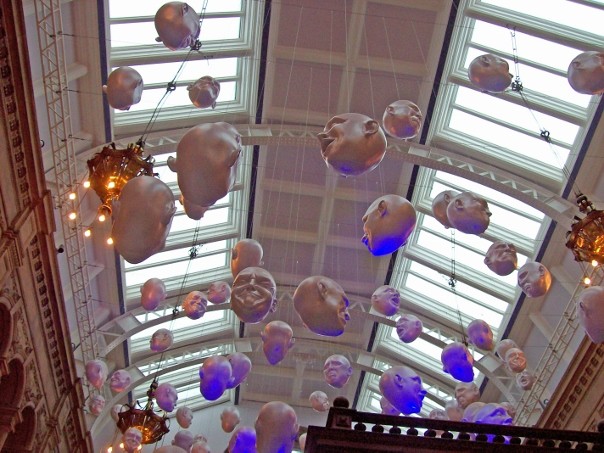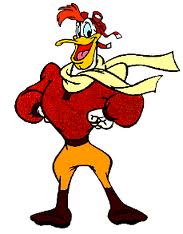If you’re in your 30s, or if you’re a fan of cartoons from the 80s and 90s, you’ll remember Launchpad McQuack as the lovable, accident-prone pilot originally from Disney’s DuckTales (1987-1990). A year after the show ended, Launchpad crashed into a spinoff series known as Darkwing Duck, which was kind of a Batman-spoof done in the DuckTales universe. The show aired from 1991-1995, so, all in all, Launchpad held on to side character fame for almost a decade.
But out of all the characters on DuckTales, why did the writers select Launchpad McQuack as the spinoff connection? Is there some sort of scientific theory behind creating a successful spinner?
First of all, we have to ask ourselves why we create spinoffs to begin with. Below are some major driving forces behind spinoff creations, as well as examples.
Supporting Character Storylines:
A good show has strong supporting characters, but if they’re not the main characters or part of the main plot lines, the adventures of these side characters may never see the light of day. It doesn’t mean writers don’t think about these other stories. (Heck – I’m sure some of the best spinoffs were born out of writers wondering how certain characters would handle various situations). When supporting characters are strong enough for their own shows, writers can use the pre-established world of the main show as a jumping off point or connecting point to the spinoffs.Some excellent examples:
- Joss Whedon’s Angel (spinoff from Buffy)
- Torchwood (spinoff from Doctor Who)
Similar Dynamic in a New Environment:
Some shows have a great dynamic of characters and situations, but they may be limited by environmental constraints, such as the physical location of the story. To re-create a similar dynamic in a new environment, all you have to do is assemble a new cast in a new town. You don’t necessarily want to make a carbon copy of the character dynamic from the original show, but you need to keep some familiar dynamics to show connections between the original and the spinoff(s). In addition, this type of spinoff series, (which maintains the pre-establish world of the original show), allows for over-arching storyline character crossovers.A few wonderful examples:
- NCIS Los Angeles (spinoff from and NCIS)
- CSI: New York and CSI: Miami (spinoffs from CSI: Crime Scene Investigations)
Cashing in on an Established Audience:
Writers and producers know that diehard fans will stick with a show till the very end. Even after a show is scheduled to cancel, executives know that the best way to capitalize on fan-loyalty involves creating a spinoff series that will start after the original ends. Disney did it with the creation of Darkwing Duck. But don’t think of cashing in as some negative, manipulative action. It certainly can be manipulative, but it’s also strategic. For example, if a show has played out all of its plot points and storylines, it does have to end with grace before it crashes miserably. However, just because the show’s main storylines have come to their inevitable conclusions, it doesn’t mean that all the characters, side stories, or back stories don’t have somewhere else to go. And, if you already have an audience invested in the show, why not give the audience exactly what they want by creating related spinoffs?A couple interesting examples:
- Caprica (backstory spinoff of Battle Star Galactica)
- Frazier (spinoff of Cheers)
Now that we have a better understanding of the why, we still need to figure out how they determine who will be the connecting spinner for character-driven spinoff series.
Looking back at the Launchpad McQuack example, let’s take a look at his character. On DuckTales he worked mainly as Scrooge McDuck’s pilot. He may have been an ineffective pilot, but he was willing to work for little money. I’m sure Launchpad’s naïve loyalty also had its benefits for Scrooge, plus Launchpad helped with taking care of Scrooge’s nephews.
One might argue that what made Launchpad such a good choice for the connecting spinner between DuckTales and Darkwing Duck was Launchpad’s brief and accidental experience being a superhero:
In the DuckTales series, Gyro Gearloose, an inventor that Scrooge knows, creates a super suit that is activated by an unusual code word: “blathering blatherskite.” Scrooge’s underpaid accountant, Fenton Crackshell, says “blathering blatherskite” on a regular basis, which results in him accidentally becoming bonded with the super suit and becoming the superhero known as GizmoDuck. At one point, however, the people of the city start questioning the true identity of GizmoDuck, and for whatever reason they suspect Launchpad. In fact, there’s even an episode where Launchpad accidentally says the code word, causing the super suit to bond to him. Through a series of mishaps and plot twists, the citizens eventually realize that there’s no way Launchpad could be the real GizmoDuck. Nevertheless, that brief encounter with being a superhero and playing with secret identities might explain why the writer’s thought Launchpad would make an excellent sidekick for superhero Darkwing Duck, a.k.a. Drake Mallard.
From this example, it appears that part of the formula for picking the spinner character could involve side-story credentials. Launchpad got to play superhero for a day, messed things up, and then had to be rescued by the real superhero. If nothing else, Launchpad must’ve realized that he doesn’t have the skill to be the man in the suit, but he has the patience, dedication, and state of mind to support the man in the suit.
Concerning other character-driven spinoffs, what other factors could be affecting the spinner character selection process?
Let’s look at the character of Frazier. He was an interesting reoccurring character on Cheers, as one of the regular barroom customers, but there was something different about him compared to the others. For one thing, most of the other side characters had generic backgrounds or were just cardboard cut-out stereotypes. Frazier, on the other hand, was a therapist who was married to a therapist, and the course of his relationship and divorce was played out on Cheers. Therefore, since his character went through a major crisis that would ultimately lead to an identity reconstruction, his character provided writers with the most fertile ground for spinoff storytelling. He was a newly divorced man who could go in any direction, but he was still an established enough character with a fan-following.
Spinner characters don’t necessarily need such an involved storyline to attract fans. Take Captain Jack Harkness from the Doctor Who series, for example. Technically, prior to the start of the spinoff series Torchwood in 2007, Captain Jack only appeared in six Doctor Who episodes. What won fans over? First of all –phenomenal charisma and sex appeal!!! Second, he was also a time traveler, but kind of a Han Solo–Captain Malcolm Reynolds type of guy, which made for a stark contrast against the series’ main time traveler, the Doctor. Third – and most likely the clincher – his whole existence is a mystery, especially since fans saw him die a hero’s death and then be brought back to life by the unfathomable power contained within the heart of the TARDIS.
Looking at these three examples alone, our spinoff science formula starts to take shape. To choose a successful spinner, it would seem you need a character with the right credentials. In other words, there has to be a good reason as to why the character works so well within the dynamic of the original series as well as the spinoff. Next, you want a side character who has a fan following, but you also need a side character who has room to grow and develop as a person, otherwise why make a spinoff series about that character? Finally, just as you need a character who has room to grow, a good spinner needs an air of mystery. Writers have to keep the suspense of the side character’s secret going so that fans are drawn in to the spinoff series. Eventually the secret will be found out, but hopefully by then fans will be deeply entrenched in the dynamic of the spinoff.

